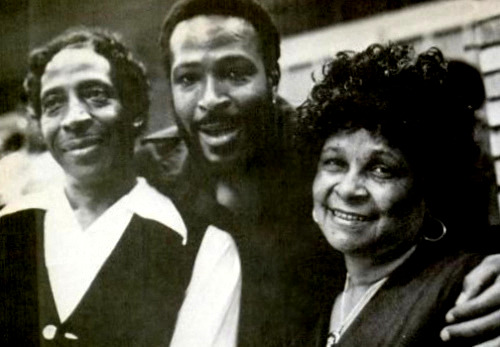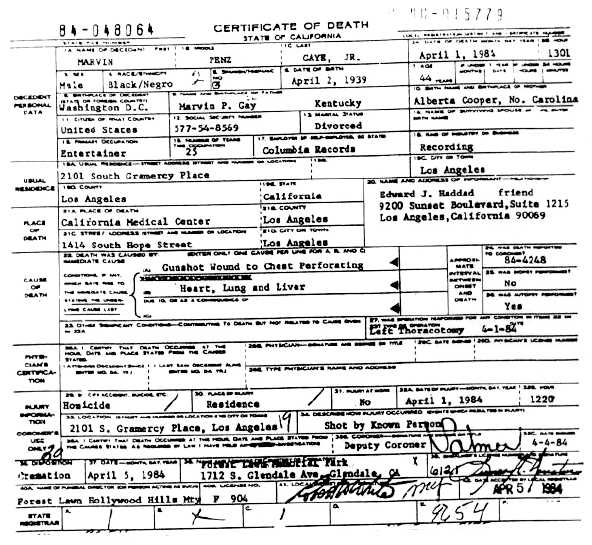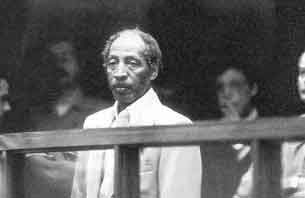
Jr.
Born to a Pentecostal church minister Marvin Gay Sr. and domestic worker Alberta Cooper Gay at the Freedman's Hospital in Washington, D.C. on 4/2/1939, Junior's first years (he is the second oldest of four children the couple will have, two sisters, Jeanne and Zeola, and a brother, Frankie, and two half-brothers, Michael Cooper, his mother's son from a previous relationship, and, Antwaun Carey Clay, from an extramarital affair by his father) are spent surviving the location (a vast slum of small, one and two-story, overcrowded buildings in disrepair, most lacking electricity and water in a region called "Simple City") neighborhood bullying and his father, a drunken, domestic abuser (and the rest of the family too) who beats and whips his son from the time he is seven into the youth's teenage years (Gaye will later state it was like "... living with a king, a very peculiar, changeable, cruel, and all powerful king" ... a king that is also a cross-dresser). Singing, discovered when he is four years old keeps Junior from suicide or a life of thuggery.

Gaye's High School

Senior, Junior, And Mom
Repeatedly kicked out of the house for disagreements with his father, Junior drops out of high school in 1956 and as a 17-year-old, enlists in the the United States Air Force as a basic airman, but finding his assignments too menial and having difficulty following orders, "fakes" mental illness and soon is discharged from the service. Out of the Air Force, Junior joins the vocal quartet of a friend called The Marquees and gets to work with Bo Diddley, relocates to Chicago and sings with Harvey and the New Moonglows, and does session work with Chuck Berry (his vocals are on "Back in the U.S.A."), Relocating again, this time to Detroit, Gaye plays drums and sings for Tri-Phi Records, before moving over to Motown subsidiary, Tamia (after his singing wows Motown owner Berry Gordy at a 1960 holiday party, who purchases Gaye's contract from Harvey Fuqua). Session work with The Miracles, The Marvelettes, and bluesman Jimmy Reed follows, along with work on a first single ("Let Your Conscience Be Your Guide") and album ("The Soulful Moods of Marvin Gaye"), released in 1961. Not an initial success, Gaye keeps at it and has his first hits in 1962 with writing the Marvelettes' hit, "Beechwood 4-5789," and his own first hit, "Stubborn Kind of Fellow." Off and running, there are concerts from coast-to-coast, and more writing and recording sessions for Tamia as Gaye builds a musical resume of a superstar singer that includes "Can I Get A Witness," "How Sweet It Is To Be Loved By You" (written for Him by the songwriting team of Holland-Dozier-Holland), "It Takes Two," "Ain't No Mountain Higher," "Ain't Nothing Like The Real Thing," "You're All I Need To Get By," "I Heard It Through The Grapevine," "What's Going On," "Let's Get It On," "Got To Give It Up," and "Sexual Healing," along with performing the National Anthem at Tiger Stadium in Detroit for the fourth game of the 1968 World Series, almost receiving a tryout to play wide receiver for the Detroit Lions in 1970 (when he contemplates giving up the music business after the cancer death of his friend, singer Tammi Terrell, at the age of only 24), headlining a UNESCO concert at New York's Radio City Music Hall to benefit the group's African literacy drive, and singing the "Star-Spangled Banner at the 1983 NBA All-Star game.
Youth

Gordy

Terrell
Performing
Superstar (he becomes known as "The Prince of Soul"), but with reaching that elevation, Gaye is exposed to the usual troubles that come with that territory ... money, women (he is married twice, both ending in divorce, including separating from first wife, Anna, the 15-years older sister of Motown owner Berry Gordy), liquor, and drugs. By 1983, the singer is in arrears to the government to the tune of 4.5 million dollars for failing to pay his back taxes, has become an addled cocaine addict (he also uses heroin) so paranoid about his safety that he wears a bullet-proof vest about when not singing (brought on by the suicide death of road crew member, Eric Sharpe), sometimes wears three overcoats, puts his shoes on the wrong feet, and speaks mostly of death and suicide ... and most troubling as he formulates his next career moves, is living in a room of the Los Angeles home he bought for his parents in 1973, where he tries to take care of his mother after she undergoes kidney surgery and spends six months fighting with his father (who is on the record with every member of the family that he will kill any of them if they put their hands on him). Building towards a dramatic climax, soul weary, in the days prior to his death, Gaye tries to commit suicide by jumping out of a moving sports car (he suffers only minor bruises) and listens to repeated arguments of his parents over a misplaced insurance policy letter.
Gaye
Parent argument occurring again, Junior warns Senior not to come upstairs after Alberta, which is like pouring gasoline on an already raging fire ... and Senior runs up the home's stairs to argue further with his wife. Junior's "STOP IT!" ignored, in a maroon robe, Gaye leaves his room and shoves his father out of his mother's abode, then begins kicking and punching the older man, releasing years of pent-up aggression. Finally separated by Alberta, Gaye goes back to his room, while Senior grabs the Christmas present weapon he keeps under the pillow on his bed. Confronting his son, while Alberta watches (and then runs out of the house believing she will be the next target while screaming, "He's shot Marvin! He's killed my boy!"), Senior moves to Gaye's bedroom doorway and without saying a word, fires two rounds into his famous son. Fatal. one shot hits the singer just below the left clavicle and exits his back, bringing the singer down to his knees, while the other slug hits the right side of Gaye's chest, perforating the entertainer's right lung, heart, diaphragm, stomach, liver, and left kidney. Fading fast, his brother Frankie runs into the house (he and his wife live in a guest cottage on the property), up the stairs, and into the bedroom where he takes his fallen brother in his arms as Gaye whispers his tortured last words, "I gt what I wanted ... I couldn't do it myself, so I had him do it ... it's good, I ran my race, there's no more left in me." The police arrive twenty minutes after the shooting, arrest Senior, and coordinate medical personnel taking Gaye to the nearby California Hospital Medical Center where the singer is pronounced dead-on-arrival at 1:01 p.m.
Arrested

Death Certificate.
The Crowds Begin Gathering
Big News
After, an autopsy will reveal Gaye has cocaine and PCP (better known as angel dust) in his system. At his funeral a few days later at Forest Lawn Memorial Park in Glendale the grief his many fans is massively on display (he goes to his final rest wearing a gold and white military style uniform with an ermine wrap around his shoulders)... over 10,000 mourners show up for the event (including both his ex-wives), singer Smokey Robinson and comedian Dick Gregory both give eulogies, Stevie Wonder performs the ballad, "Lighting Up The Candles," and Cecil T. Jenkins sings "The Lord's Prayer." The singer leaves behind no will and at the time of his death still owes the IRS a million dollars, the State of California $600,000, and his wives and children $300,000 in alimony (royalties from his music catalog have since paid off the debts).
The End
As for the father (who Alberta provides bail for, but also divorces), with a benign tumor found at the base of his brain, the history of hate between father and son, the drugs in Gaye's system, and photos of the bruises Senior got fighting with Junior, on September 20, 1984, Judge Gordon Ringer allows Gay to plead no contest to a charge of voluntary manslaughter and gives the old man a six-year suspended sentence and five years of probation for the killing, with Gay also being prohibited frm ever owning a firearm or drinking alcohol for the rest of his life. No jail time required, the rest of his life ends at a nursing home in Culver City, California where Senior dies of pneumonia on October 10, 1998 at the age of 84.

At Senior's Sentencing
No April Fools joke, or at least not one anyone finds funny, R&B superstar Marvin Gaye Jr. is killed by his father, Marvin Gay Sr.. on this day in 1984.

Gaye . .
No comments:
Post a Comment